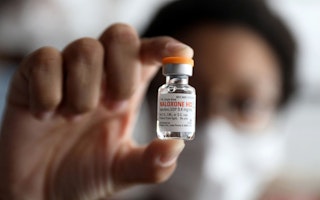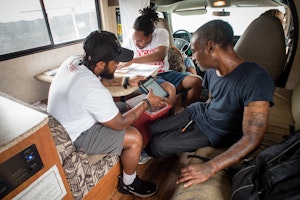How Improving Women’s Rights Helps Stop AIDS in Africa
By Tamar Ezer
Women in Africa are routinely deprived of rights to land, property, and housing—a situation contributing to, and worsened by, the AIDS epidemic.
As the Center on Housing Rights and Evictions has noted, throughout sub-Saharan Africa, “in many cases, subsequent to the HIV/AIDS related deaths of male partners or disclosure of their HIV/AIDS status, women are divested of their marital property, inheritance rights, livelihoods, and at times even their children, by relatives who forcibly evict them from their homes.”
Moreover, deprived of economic resources, women may be trapped in abusive relations where they are unable to take steps to protect themselves from HIV infection or seek treatment. Impoverished, women also have reduced capacity to cope with the disease.
Women living with HIV suffer abuse in health care, including discrimination, and violations of their consent to treatment and patient confidentiality. Forced or coerced sterilization of women living with HIV is unfortunately all too common, as documented in Kenya, Namibia, and South Africa.
Last month, however, the African Commission on Human and Peoples’ Rights (the main regional human rights body in Africa) has taken a stand on the side of justice.
In two landmark resolutions, it urged states to “protect and promote women’s right to land and property” and “to put in place mechanisms to ensure that women living with HIV are not subjected to coercion, pressure or undue inducement by health care providers ... in order to secure consent for sterilization.”
The Resolution on Women’s Right to Land and Productive Resources specifically calls for:
- Repeal of discriminatory laws, and reform of customary practices that limit women’s access to, and control over, land and other property
- Land reforms to ensure equal treatment for women
- Legal protection for women against evictions and dispossession of land
- Effective remedies for violations, including free legal assistance to ensure compensation and return of land
- Integration of women’s land and property rights in national HIV and AIDS strategies
The Resolution on Involuntary Sterilisation and the Protection of Human Rights in Access to HIV Services calls for:
- National laws reflecting the principles of free and informed consent in health care for women living with HIV
- Information on HIV and reproductive health services in a language women understand
- Regular trainings of medical personnel on human rights in health care
- Investigation of allegations of involuntary sterilization of women living with HIV
- Complaint mechanisms, legal assistance, and reparations for women who have been involuntarily sterilized
Women in Africa are one step closer to justice.
States must now take heed and ensure that critical human rights protections do not overlook half of the population. It is time to respect, protect, and fulfill the fundamental rights of African women.
Open Society supports the African Gender and Media Initiative; the Global Initiative for Economic, Social, and Cultural Rights; and the South Africa Litigation Centre, which successfully advocated for these resolutions.
Until June 2016, Tamar Ezer was deputy director of the Law and Health Initiative of the Open Society Public Health Program.

